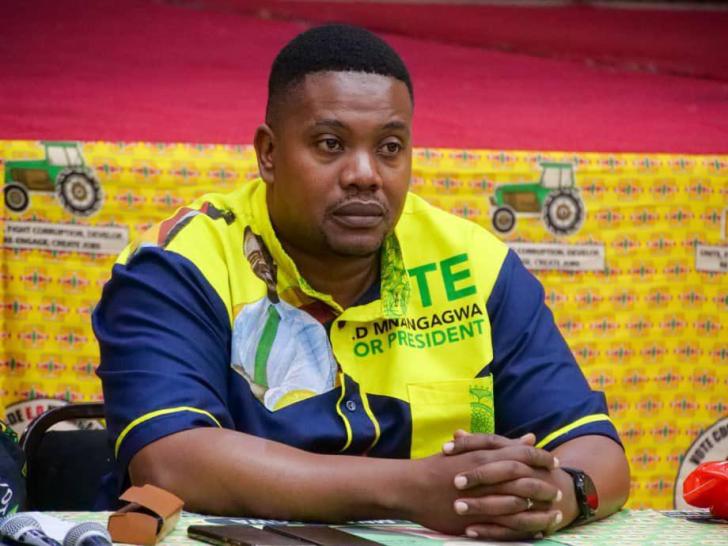News / Local
'Zanu-PF is too powerful for Western Puppets,' says Marapira
05 Dec 2024 at 09:18hrs |
0 Views

ZANU-PF has dismissed claims from opposition parties within the Southern African Development Community (SADC) that the party has been involved in meddling in the electoral processes of neighboring countries. The ruling party, led by President Emmerson Mnangagwa, is accused of supporting ruling parties in Mozambique, South Africa, Botswana, and Namibia, all of which are also former liberation movements.
In an exclusive interview with Business Times, ZANU-PF's Director of Information and Publicity, Farai Marapira, strongly rejected the accusations, asserting that the party's strength lies not in interference but in its deep commitment to the values of Africa. Marapira emphasized that ZANU-PF's ideological foundation is built on resisting neocolonial influences and asserting African sovereignty. He stated:
"As ZANU-PF, we are powerful but not in the essence of manipulation. We are powerful because we represent a very strong ideal. We are powerful because we represent the true values of Africa."
Marapira also expressed frustration with what he described as the hypocritical stance of imperialist forces, who, according to him, have historically sought to undermine Africa's independence. He referred to the global powers who, after industrializing, sought to subjugate African nations and now attempt to label only those governments they support as democratic. Marapira continued:
"You must understand that these so-called proponents of democracy came into Africa on the back of their industrialization, which was ahead of ours, and chose to put us on an even keel with dogs, stating that dogs and Africans are not allowed in here today."
ZANU-PF claims that the real threat to African sovereignty comes from imperialist forces and their local allies, whom the party accuses of attempting to destabilize African nations that have resisted foreign control. Marapira further argued that these forces, including figures such as former Botswanan President Ian Khama and South African political leader Mmusi Maimane, are desperate and have run out of ideas in their attempts to weaken the resolve of African countries. He stated:
"When a party like ZANU-PF stands against such a formidable force and defies it, of course, people are bound to have sleepless nights, and the Brenthurst Foundation is at its end, all its foot soldiers, Ian Khama and Mmusi Maimane; they are at their wit's end. They've run out of ideas."
Marapira framed the ongoing opposition to ZANU-PF as part of a broader struggle for African self-determination, where the people of Africa are rediscovering and redefining their true history and values, independent of colonial influence. He concluded:
"This is not about ZANU-PF; this is about African people rediscovering themselves, African people redefining themselves outside of the colonial context."
The comments reflect ZANU-PF's long-standing narrative of resistance against foreign interference and imperialism, a theme that has shaped much of the party's rhetoric since Zimbabwe's independence. As tensions continue to rise between ZANU-PF and opposition voices within the SADC region, the ruling party remains firm in its stance, framing the ongoing political struggles as part of a broader fight for African unity and self-determination.
In an exclusive interview with Business Times, ZANU-PF's Director of Information and Publicity, Farai Marapira, strongly rejected the accusations, asserting that the party's strength lies not in interference but in its deep commitment to the values of Africa. Marapira emphasized that ZANU-PF's ideological foundation is built on resisting neocolonial influences and asserting African sovereignty. He stated:
"As ZANU-PF, we are powerful but not in the essence of manipulation. We are powerful because we represent a very strong ideal. We are powerful because we represent the true values of Africa."
Marapira also expressed frustration with what he described as the hypocritical stance of imperialist forces, who, according to him, have historically sought to undermine Africa's independence. He referred to the global powers who, after industrializing, sought to subjugate African nations and now attempt to label only those governments they support as democratic. Marapira continued:
"You must understand that these so-called proponents of democracy came into Africa on the back of their industrialization, which was ahead of ours, and chose to put us on an even keel with dogs, stating that dogs and Africans are not allowed in here today."
ZANU-PF claims that the real threat to African sovereignty comes from imperialist forces and their local allies, whom the party accuses of attempting to destabilize African nations that have resisted foreign control. Marapira further argued that these forces, including figures such as former Botswanan President Ian Khama and South African political leader Mmusi Maimane, are desperate and have run out of ideas in their attempts to weaken the resolve of African countries. He stated:
"When a party like ZANU-PF stands against such a formidable force and defies it, of course, people are bound to have sleepless nights, and the Brenthurst Foundation is at its end, all its foot soldiers, Ian Khama and Mmusi Maimane; they are at their wit's end. They've run out of ideas."
Marapira framed the ongoing opposition to ZANU-PF as part of a broader struggle for African self-determination, where the people of Africa are rediscovering and redefining their true history and values, independent of colonial influence. He concluded:
"This is not about ZANU-PF; this is about African people rediscovering themselves, African people redefining themselves outside of the colonial context."
The comments reflect ZANU-PF's long-standing narrative of resistance against foreign interference and imperialism, a theme that has shaped much of the party's rhetoric since Zimbabwe's independence. As tensions continue to rise between ZANU-PF and opposition voices within the SADC region, the ruling party remains firm in its stance, framing the ongoing political struggles as part of a broader fight for African unity and self-determination.
Source - pindula
Join the discussion
Loading comments…































